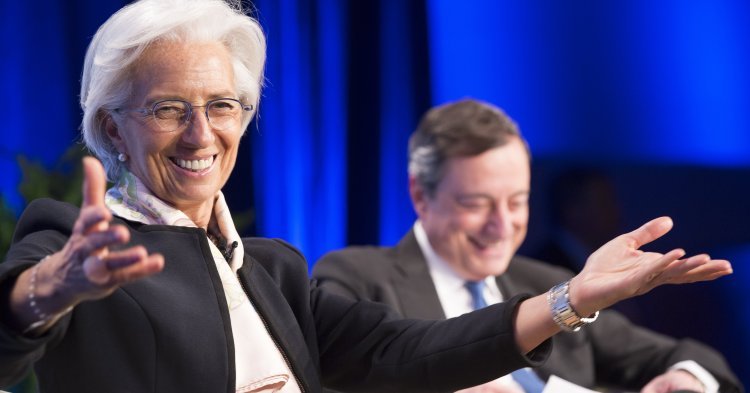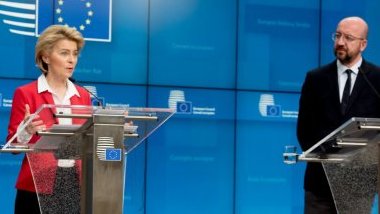Emmanuel Saez and Gabriel Zucman, for example, have highlighted the importance of providing liquidity, and have called for governments to become ‘payers [and lenders] of last resort’, ‘so that hibernating businesses can keep paying their workers (instead of laying them off) and paying their necessary bills (instead of going bankrupt).’ Garicano, similarly, has proposed a ‘Covid-19 bazooka for jobs in Europe’, with governments paying part of workers’ salaries to avoid layoffs. This approach has been largely adopted by Denmark, while the Spanish, Italian and French governments, through ambitious fiscal stimulus plans, seem to have combined both rationales.
Europe’s existential problem
While Member States, in a clear departure from the economic orthodoxy observed during the Eurozone crisis, attempt to inject money into their economies to avoid a widespread recession, the EU has been characterized by its reluctance to intervene. Indeed, the coronavirus crisis has, once again, served to highlight two of the existential problems at the heart of Europe. On the one hand, the unwillingness of many leading futures – including ECB president Christine Lagarde – to move away from their economic dogmatism, even in times of deep crisis and against all the evidence. On the other, the inadequacy of the EU’s current institutional framework – in this case, of the Economic and Monetary Union (EMU) - in times of macroeconomic instability.
As Lidia Brun, of the Free University of Brussels, has observed, the EMU lacks the very tools it needs to tackle the present crisis: ‘sufficient resources for a strong fiscal stimulus, and the establishment of a ‘firewall’ in the sovereign bonds market’. The current patchwork solutions it can provide – including European Investment Bank funds; direct ECB support for sovereign bonds issued by the Member States most affected by the virus; a specific fund supported by the European Stability Mechanism (ESM); or money provided by the EU Solidarity Fund – are inadequate, too small and subject to excessively formalistic Treaty restrictions. And as Italian President Mattarella seemed to denounce last week, the EU’s limited intervention through such mechanisms, if combined with a blind application of fiscal restraints and state aid restrictions, risks hindering Member States’ actions, rather than aiding them.
Jean Monnet famously claimed that Europe is built through crises and is the sum of their solutions. In 2012, faced with the collapse of the Eurozone, ECB president Mario Draghi vowed to do ‘whatever it takes’ to save the Euro - as, indeed, he did. Years later, and in stark contrast, European Commission president Jean-Claude Juncker was forced to apologize for the troika’s ‘lack of solidarity’ towards Greece – a euphemism for the devastating austerity measures which, against economic evidence, it imposed on the lower and middle classes of Southern Europe.
If the Eurozone crisis taught us one thing, it is that stronger fiscal integration is required if the EU is to effectively challenge a future economic crisis: as Laura Reichlin has pointed out, ‘even in relatively well-equipped countries, unilateral, ad hoc measures [by national governments] have only limited potential’. In what is shaping up to be the EU’s most acute crisis since the Greek bailout, countries cannot be left to their own: the current pandemic, in other words, cannot become a ‘survival of the fittest’ between Member States. Yet this is precisely what the Council and the Commission, by opting to ignore the problem and failing to apply Article 122 TFEU [1], are aiding and abetting.
At a crossroads
Governments – including the European Commission – are best judged by their actions in times of crisis. The coronavirus pandemic can make or break the von der Leyen Commission – one which was born with little parliamentary support, has been criticized for its dependence on the Hungarian and Polish governments and has been characterized, thus far, for its lack of legislative projects or a clear political message.
If it follows its current approach, and is reticent and slow (or even unwilling, in Christine Lagarde’s case) to intervene, coronavirus can inflict a devastating blow on the legitimacy of an already weakened EU. Faced with the collapse of the Italian and Spanish healthcare systems and with the spectre of an economic recession, the Union simply cannot afford to get lost in budgetary straightjackets, procedural requirements or the worship of a mistaken economic orthodoxy. If it does so, the European project, as a whole, will be – rightly – called into question.
If, on the other hand, it learns its lessons from the Eurozone crisis, and is brave and ambitious, this pandemic can be turned into a life-saving opportunity for a European Union which is slowly (but very steadily) running out of steam. Decisive joint action by the Commission the European Council and a ‘pooling together’ of resources can be channeled into momentum towards further economic integration and Union-wide solidiarity – including a stronger Eurozone with its own budget and a coordinated fiscal policy; one which, in times of social and economic crisis, is capable of reaching out to help those in need.





Follow the comments: |
|
